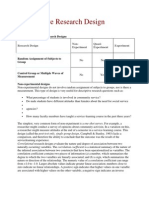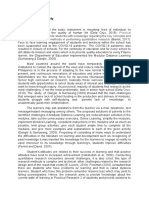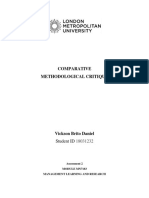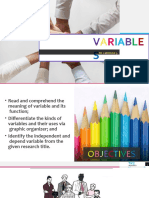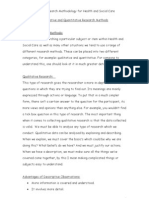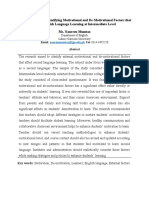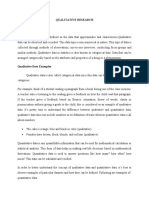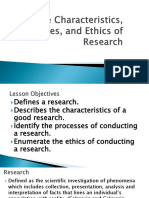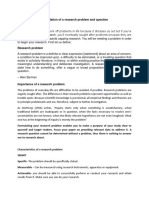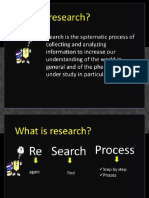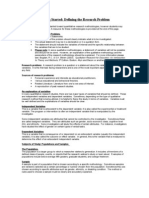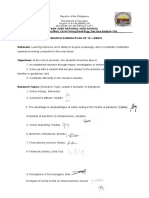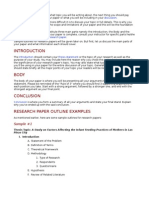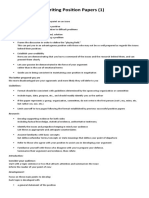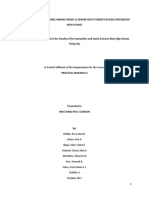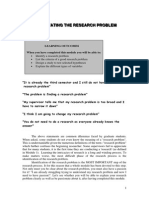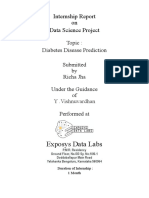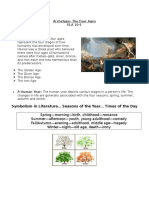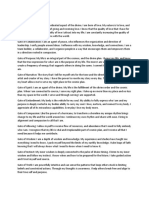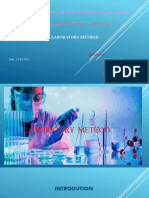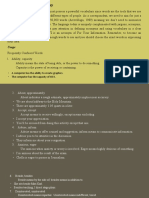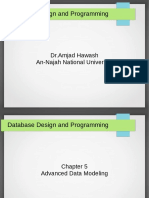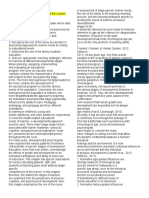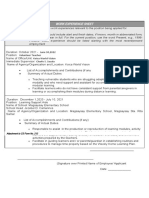The Research Problem
The Research Problem
Uploaded by
Shai Jenne AroCopyright:
Available Formats
The Research Problem
The Research Problem
Uploaded by
Shai Jenne AroCopyright
Available Formats
Share this document
Did you find this document useful?
Is this content inappropriate?
Copyright:
Available Formats
The Research Problem
The Research Problem
Uploaded by
Shai Jenne AroCopyright:
Available Formats
THE RESEARCH PROBLEM
A) STATEMENT OF THE RESEARCH PROBLEM For some students this is the most difficult phase of the research process. Quite often the Research Problem is vague. It is either too scanty or too lengthy but not precise. Despite having written so many paragraphs, the student is unable to state clearly and convincingly: what is the problem? why it is important? what should be done? Perhaps, the following guidelines on the right may help you with this task. i) What is the Problem? You begin by first stating the problem. It is some aspect that your are worried about, think about and want to find a solution for. e.g. Graduate are poor critical thinkers. ii) Why is it important that the problem be investigated? i.e give a rationale for why it is of concern. For Example: Employers are complaining about the poor critical thinking skills of graduates they employ Questions about this problem has not been answered convincingly or are inconclusive or answers have not been found up to the present - e.g. Very few studies have addressed the critical thinking ability of university students as most studies continue to focus on primary and secondary school students. ii) What should be done? i.e. the Purpose Your purpose is to solve the problem; i.e. find answers to questions put forward. State what should be done clearly and grammatically correct. Avoid meaningless words. There should be no doubt in your mind what are your intentions. It is good practice to divide you problem into sub-problems which are called research questions. Research Questions guide the solution of the problem
Example: "Specifically, this study aims to answer the following research questions: a) Is there a difference in critical thinking male and female students? b) Is there a relationship between academic performance and critical thinking? B) RESEARCH QUESTION The word "research" means 'finding out' or 'discovery' using a systematic method. You "research" by asking questions and searching for answers to the questions. You cannot "research" if you do not want to know anything, that is, you must have something you would like to know more about before you can do "research". You begin with QUESTIONS. If you have none, you will find no answers or will not know when you have found one. Your task is to conduct RESEARCH. A study without a question in mind will NOT be a RESEARCH study. You should MAKE SURE that the research question is: a) Clear, straightforward and easily understood by others b) States the relationship between two or more variables. c) The variables mentioned in the Research Question should be measurable. d) The answer to the Research Question is not immediately obvious. e) Indicates the method that is to be adopted. f) Can be answered in the time available to you. g) Can be answered with the resources available to you.
TYPES OF RESEARCH QUESTIONS: Generally there are three basic types of questions that research projects can address: 1. Descriptive Research Questions Here you describe what is going on or what exists. For example, you may want to find the proportion of teachers who support the teaching of sex education in secondary school. You are simply interested in describing something. Statistical Tools: - Mean, median and mode - Frequency tables - Histograms, Line graphs 2. Relational Research Questions Here you want to know the relationships between two or more variables. For example, you want to know the proportion of males and females who support the teaching of sex education in secondary school. In other words, you are interested in studying the relationship between gender and preference for teaching of sex education. Statistical Tools: - Simple correlation - Linear regression - Multiple regression 3. Causal Research Questions Here, you want to know whether one or more variables (e.g., a programme or treatment variable) causes or affects one or more outcome variables. For example, you conduct a workshop to the group of teachers to determine whether their opinion about teaching sex education to secondary school students has changed. Statistical Tools: - t-test - Analysis of Variance (ANOVA) - Multiple Analysis of Variance (MANOVA)
You might also like
- Elbaum Sandra N Grammar in Context 1Document304 pagesElbaum Sandra N Grammar in Context 1Olha Diahilieva100% (10)
- Quantitative Research Paper-FormatDocument4 pagesQuantitative Research Paper-FormatJmaseNo ratings yet
- How To Write A Research TitleDocument2 pagesHow To Write A Research TitleAhmad Nuruz ZamanNo ratings yet
- Parental Involvement Rate On The Blended Modular Learning of StudentsDocument8 pagesParental Involvement Rate On The Blended Modular Learning of StudentsAngeline CaraleNo ratings yet
- Experimental ResearchDocument4 pagesExperimental ResearchBahya Al Fitri100% (1)
- Conceptual FrameworkDocument15 pagesConceptual FrameworkKaren R. Aglanao100% (3)
- Quantitative Research Kind and Its ImportanceDocument32 pagesQuantitative Research Kind and Its ImportanceRellie CastroNo ratings yet
- Lesson 5 Stating Research QuestionsDocument20 pagesLesson 5 Stating Research QuestionsChelsea FloresNo ratings yet
- PracResearch2 Grade-12 Q4 Mod6 Research-Conclusions-And-Recommendations Version3Document32 pagesPracResearch2 Grade-12 Q4 Mod6 Research-Conclusions-And-Recommendations Version3Jiemalyn Asis GregorioNo ratings yet
- Quantitative Research DesignDocument8 pagesQuantitative Research DesignAufa liaNo ratings yet
- Quantitative Research DesignDocument4 pagesQuantitative Research DesignDianne ComonNo ratings yet
- Paper Review 1Document4 pagesPaper Review 1Min BeshNo ratings yet
- ThesisDocument94 pagesThesisAimzyl Operio TriaNo ratings yet
- How To Write A Purpose StatementDocument4 pagesHow To Write A Purpose StatementptaduyNo ratings yet
- Parametric Evaluation of Biriran (Averrhoa Carambola Linn.) Fruit Wine Fermented in Varying ConditionsDocument24 pagesParametric Evaluation of Biriran (Averrhoa Carambola Linn.) Fruit Wine Fermented in Varying ConditionsRaging PotatoNo ratings yet
- Background of The StudyDocument2 pagesBackground of The StudyImee BorinagaNo ratings yet
- Practical Research 1 ModuleDocument48 pagesPractical Research 1 ModulefergusNo ratings yet
- Research ImportanceDocument4 pagesResearch ImportanceRimaQuitain100% (1)
- Critique Paper On Quantitative ResearchDocument6 pagesCritique Paper On Quantitative ResearchFidel ManaolNo ratings yet
- Research CritiqueDocument20 pagesResearch CritiquePrincy John0% (1)
- Chapter 3Document5 pagesChapter 3Mr DamphaNo ratings yet
- Qualitative ResearchDocument52 pagesQualitative Researchhjaromptb97% (32)
- Research Paper Proposal Outline TimelineDocument5 pagesResearch Paper Proposal Outline Timelineapi-354694599No ratings yet
- ClassesDocument12 pagesClassesAnonymous r9b4bJUNo ratings yet
- Sample Quantitative ResearchDocument62 pagesSample Quantitative ResearchChimar DhineeshaNo ratings yet
- Thesis 1Document59 pagesThesis 1Mia DacilloNo ratings yet
- 3 VariablesDocument30 pages3 VariablesJoHan Xyth Rizaldo100% (1)
- Unit Ii Leson 1Document8 pagesUnit Ii Leson 1Krhyz Axl Ramos-Buraga ValenzuelaNo ratings yet
- Chapter ProposalDocument6 pagesChapter ProposalClariza PascualNo ratings yet
- Qualitative Sampling Techniques Elmusharaf 2016Document24 pagesQualitative Sampling Techniques Elmusharaf 2016Caranias Frences100% (1)
- Qualitative and Quantitative Research MethodsDocument6 pagesQualitative and Quantitative Research Methodsseagoddess_simo100% (2)
- INTERVIEW PROTOCOL - G11 HUMSS F - GRP 5 1ELLA MATIASDocument3 pagesINTERVIEW PROTOCOL - G11 HUMSS F - GRP 5 1ELLA MATIASKim SeokjinNo ratings yet
- Writing The : Context/ RationaleDocument49 pagesWriting The : Context/ RationaleRhen CareNo ratings yet
- A Survey Study On Identifying Motivational and De-Motivational Factors That Affect English Language Learning at Intermediate Level Ms. Naureen MumtazDocument1 pageA Survey Study On Identifying Motivational and De-Motivational Factors That Affect English Language Learning at Intermediate Level Ms. Naureen MumtazNaureen MumtazNo ratings yet
- Prac Research Module 2Document12 pagesPrac Research Module 2Dennis Jade Gascon NumeronNo ratings yet
- Qualitative ResearchDocument9 pagesQualitative Researchsuhail iqbal sipraNo ratings yet
- LESSON 3 Characteristics, Processes and Ethics of ResearchDocument67 pagesLESSON 3 Characteristics, Processes and Ethics of ResearchMarie EspinosaNo ratings yet
- Samples of Qualitative ResearchDocument2 pagesSamples of Qualitative ResearchMichelle Berme100% (2)
- Formulation of A Research Problem and QuestionDocument6 pagesFormulation of A Research Problem and QuestionCates CaponNo ratings yet
- 5 Problem StatementDocument7 pages5 Problem StatementZulhilmi Rosli50% (2)
- IMRaD FormatDocument20 pagesIMRaD FormatMichelle Senosin Dimero100% (1)
- Problem Statement HandoutDocument2 pagesProblem Statement HandoutAalok KarnaNo ratings yet
- Research GapDocument1 pageResearch GapJohn Patrick MolinaNo ratings yet
- Quantitative ResearchDocument23 pagesQuantitative ResearchGraemy Manugay100% (1)
- (ABM-A) - Research AgendaDocument2 pages(ABM-A) - Research AgendaLadylyn BuellaNo ratings yet
- Research Title and Background of The StudyDocument16 pagesResearch Title and Background of The StudyMikaella L. DaquizNo ratings yet
- Sample Research PaperDocument4 pagesSample Research PaperMan-man Escalona ApuraNo ratings yet
- Common Problems and Actions Taken in The Philippine Education SystemDocument3 pagesCommon Problems and Actions Taken in The Philippine Education SystemDoods Galdo88% (16)
- Prelim PR1Document2 pagesPrelim PR1Catherine Mojica0% (1)
- Research HypothesisDocument3 pagesResearch HypothesisMahrukh JawedNo ratings yet
- A Concept PaperDocument8 pagesA Concept PaperEstherNalubegaNo ratings yet
- Difference Between Qualitative and QuantitaveDocument13 pagesDifference Between Qualitative and QuantitaveFarooq SialNo ratings yet
- Research Method IIDocument103 pagesResearch Method IIAlfatah muhumedNo ratings yet
- What Is A Position PaperDocument7 pagesWhat Is A Position PaperRico RilleraNo ratings yet
- Basic ResearchDocument38 pagesBasic ResearchmiguelNo ratings yet
- Module 2.stating - ProblemDocument10 pagesModule 2.stating - ProblemSaheli MukherjeeNo ratings yet
- Chapter 2.stating - ProblemDocument10 pagesChapter 2.stating - ProblemTracy HoNo ratings yet
- Research Problems/TopicsDocument4 pagesResearch Problems/TopicsFebriani Chuzilfa AriefNo ratings yet
- The Easiest Way To Learn Active & Passive Voice For EveryoneDocument14 pagesThe Easiest Way To Learn Active & Passive Voice For Everyonespreadeducationforallbyasadimran100% (2)
- International Symposium On Language and Communication: Research Trends and Challenges (ISLC) ProceedingDocument164 pagesInternational Symposium On Language and Communication: Research Trends and Challenges (ISLC) ProceedingMuzaffer Derya NazlıpınarNo ratings yet
- Exposys Data Labs: Internship Report On Data Science ProjectDocument23 pagesExposys Data Labs: Internship Report On Data Science ProjectDhyeayaNo ratings yet
- LeaP Math G10 Week 3 Q3Document4 pagesLeaP Math G10 Week 3 Q3Cles tinodiNo ratings yet
- Nursing Care Plan ADocument6 pagesNursing Care Plan ACrystal WyattNo ratings yet
- 3085 17024 1 PBDocument8 pages3085 17024 1 PBaanNo ratings yet
- Four Ages and A Human YearDocument4 pagesFour Ages and A Human Yearapi-465927221No ratings yet
- Affirmations For Quantum HumanDocument2 pagesAffirmations For Quantum HumanKali Jasso100% (1)
- Analysing English Sentences A Minimalist Approach PDFDocument542 pagesAnalysing English Sentences A Minimalist Approach PDFkasuri123100% (4)
- He Reviewer MidtermsDocument17 pagesHe Reviewer MidtermsmaettNo ratings yet
- Borderlands of The SpiritDocument218 pagesBorderlands of The Spiritcrimsonskies911100% (1)
- EmpathyDocument7 pagesEmpathyLaRaFulga0% (1)
- Classroom Management PPT Oujda Acedemy, September 2021Document44 pagesClassroom Management PPT Oujda Acedemy, September 2021Imane ArbaouiNo ratings yet
- Physical ScienceDocument15 pagesPhysical ScienceAchu AniNo ratings yet
- MMDSTDocument2 pagesMMDSTinah krizia lagueNo ratings yet
- Behaviour Modification Report IDLDocument13 pagesBehaviour Modification Report IDLAmartya SenNo ratings yet
- Reviewer Prof EdDocument33 pagesReviewer Prof EdDexter RaboNo ratings yet
- Technical Communication 4BDocument7 pagesTechnical Communication 4BJulius ChavezNo ratings yet
- ML SyllabusDocument3 pagesML SyllabusKasi BandlaNo ratings yet
- Teacher Feedback To Young Children in Formative Assessment: A TypologyDocument16 pagesTeacher Feedback To Young Children in Formative Assessment: A TypologyJorge AlarcónNo ratings yet
- 12 Rules For Subject-Verb: Not With Any Other Noun That May Immediately Precede ItDocument2 pages12 Rules For Subject-Verb: Not With Any Other Noun That May Immediately Precede ItJwayne Vaughn GonzalesNo ratings yet
- Chapter 5 PDFDocument33 pagesChapter 5 PDFosama mallohNo ratings yet
- Arts and Design in Primary School: Assignment 1: EssayDocument4 pagesArts and Design in Primary School: Assignment 1: EssayMayaNo ratings yet
- Characteranalytical VegetotherapyDocument10 pagesCharacteranalytical VegetotherapyEscuela Española de Psicoterapia Reichiana100% (1)
- Digital Paper TrailDocument6 pagesDigital Paper Trailapi-665972868No ratings yet
- Chapters 5 and 6Document56 pagesChapters 5 and 6Lady DanielleNo ratings yet
- Oral Com ActDocument1 pageOral Com ActAngel VillaflorNo ratings yet
- Deni Sutisna - SI - 1195030050Document18 pagesDeni Sutisna - SI - 1195030050Adi Rahmat BasukiNo ratings yet
- Work Experience Sheet: Instructions: 1. Include Only The Work Experiences Relevant To The Position Being Applied ForDocument1 pageWork Experience Sheet: Instructions: 1. Include Only The Work Experiences Relevant To The Position Being Applied ForRinazel AmoraNo ratings yet











